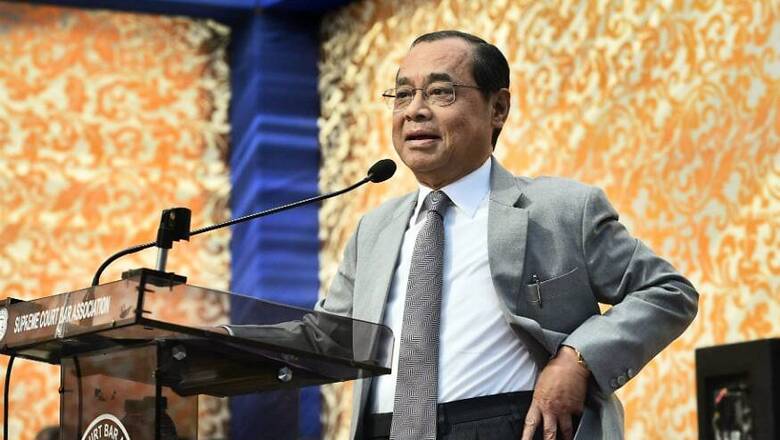
views
New Delhi: A late evening notification by the union home ministry announcing the appointment of Ranjan Gogoi, barely four months after he retired as the Chief Justice of India, to the Rajya Sabha has stirred a political controversy. Many, including one of Gogoi's former colleagues at Supreme Court, Justice (retd) Madan Lokur has expressed dismay.
“There has been speculation for some time now about what honorific Justice Gogoi would get. So, in that sense the nomination is not surprising, but what is surprising is that it came so soon. This redefines the independence, impartiality and integrity of the judiciary. Has the last bastion fallen?” Lokur told the Indian Express.
Gogoi, the 65-year-old former CJI who served for a period of about 13 months, is not the first ex-CJI to have been nominated to the upper house of the Parliament after his retirement. There are at least two precedents to this situation - Justice Ranganath Misra in 1998 and Justice Baharul Islam in 1983. But in neither cases was the 'cooling-off' period, the time between demitting office and being appointed to another constitutional office, so brief.
Of the two judges Justice Baharul Islam had a smaller cooling period. He retired as the CJI in January 1983 and was sent to Rajya Sabha in June 1983 by the then Prime Minister Indira Gandhi. He had earlier also served as a Rajya Sabha MP from Assam for two consecutive terms from 1962 to 1972. Justice Islam got his third term as Rajya Sabha MP four weeks after he delivered a judgment absolving the then Chief Minister of Bihar Jagannath Mishra of all corruption charges in an urban cooperative bank scandal.
Justice Ranganath Misra retired as the CJI in November 1991 and was voted to a seat in the Rajya Sabha in 1998 on a Congress ticket. Though at that time, Atal Bihari Vajpayee-led BJP was in power. Justice Misra was the same person who, while being a sitting judge of the Supreme Court, led and compiled the commission of inquiry in 1985 in the '84 anti-Sikh riots.
Justice Misra had recommended formation of three more committees to look into the role of police, registration of cases and to determine the total number of killings. His report gave a clean chit to Rajiv Gandhi and senior Congress leader HKL Bhagat, and did not find any particular reason for police inaction.
The tenure of Justice Gogoi, who was appointed as a permanent judge of the Gauhati High Court in February 2001, got transferred to the Punjab and Haryana High Court in September 2010, and was elevated as a judge of the Supreme Court in April 2012, will however be remembered perhaps for defining cases like Rafale, CBI vs CBI, Ram Mandir and the NRC process. And for the demands made by Congress to impeach Justice Gogoi.
It was a bench headed by Justice Gogoi that gave the go-ahead for the launch of National Register of Citizens (NRC) process in Assam. However, the charge of sexual harassment that was levelled against him by an employee of the Supreme Court would perhaps also be remembered when one recalls his tenure. In April 2019, reports surfaced in the media that a Supreme Court staffer had accused the CJI of sexual harassment.
The allegation came to light after the woman sent a letter along with affidavits to all 22 (at the time) apex court judges. The case was sent to an SC panel, where the charges were found to be baseless. Many including former Supreme Court judges had slammed the manner in which the case was handled by the Supreme Court under him.




















Comments
0 comment